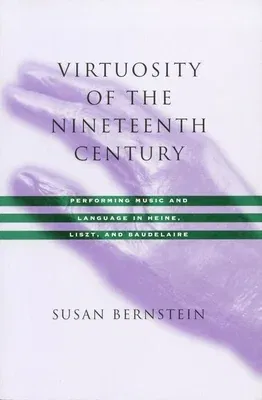Susan Bernstein
(Author)Virtuosity of the Nineteenth Century: Performing Music and Language in Heine, Liszt, and BaudelairePaperback, 1 December 1998

Qty
1
Turbo
Ships in 2 - 3 days
In Stock
Free Delivery
Cash on Delivery
15 Days
Free Returns
Secure Checkout

Print Length
252 pages
Language
English
Publisher
Stanford University Press
Date Published
1 Dec 1998
ISBN-10
0804735050
ISBN-13
9780804735056
Description
Product Details
Author:
Book Format:
Paperback
Country of Origin:
US
Date Published:
1 December 1998
Dimensions:
23.44 x
15.75 x
1.47 cm
Genre:
19th Century
ISBN-10:
0804735050
ISBN-13:
9780804735056
Language:
English
Location:
Stanford, CA
Pages:
252
Publisher:
Weight:
367.41 gm